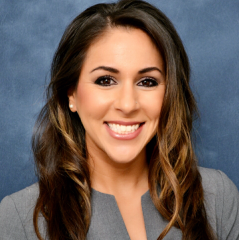A recent study named Arizona one of several “hot spots” in the nation for higher-than-average rates of nonmedical vaccination exemptions. According to the study, published in the journal PLOS Medicine, Arizona has seen an increase in the number of parents seeking vaccination exemptions for their children for religious or philosophical reasons.
According to the study, for the 2016-17 school year, Maricopa County issued 2,947 nonmedical exemptions, the most of any metropolitan area in the country. The next highest number of nonmedical exemptions — 956 — were issued in Salt Lake County in Utah.
To better understand how vaccination exemptions are granted and what these findings mean for Arizona’s public health, ASU Now spoke with Alexandra Bhatti, faculty associate in Arizona State University’s College of Health Solutions.
Question: How do school vaccination laws vary from state to state? How are exemptions obtained?
Alexandra Bhatti
Answer: Each state establishes laws governing vaccination requirements for child care and schoolchildren. One could say, if you have seen one state’s school vaccination laws, then you have seen one state’s school vaccinations laws. No two are identical. Most states adhere to the Advisory Committee on Immunization Practices for determining age, dosage and types of vaccines required.
State laws include exemptions to school vaccination requirements for religious or philosophical reasons, commonly referred to as “nonmedical exemptions.” While all states allow medical exemptions, fewer allow personal-belief or religious exemptions. The ease in which exemptions may be attained varies from state to state. Some require only parental signature, whereas others require a parent to complete a vaccination education module before obtaining a nonmedical exemption.
In addition to vaccination exemptions, students may still attend school without meeting vaccination requirements through a grace period or provisional enrollment. Provisional-enrollment laws allow students to attend school without complete vaccinations if they can show they are in the process of obtaining them. Grace-period laws allow students to attend school for a defined period of time without having to show that they are in the process of being vaccinated or exempted. In Arizona, however, no grace period is offered and students must show either proof of vaccination or an exemption in order to attend school.
State vaccination laws are important for maintaining high vaccination rates, and in turn, lowering the rates of vaccine-preventable diseases (VPDs). Vaccination requirements that have more conditions for receiving a nonmedical exemption, that require parental documentation of exemption requests and that are implemented with strong enforcement and monitoring may help promote higher rates of vaccination coverage and, in turn, lower rates of VPDs in the community.
Q: What are the risks associated with having a growing number of residents who are not vaccinated?
A: We can expect more outbreaks like the Disneyland measles outbreak in 2014 to 2015.
Before the middle of the last century, diseases like whooping cough, polio, measles, Haemophilus influenzae and rubella struck hundreds of thousands of infants, children and adults in the United States. Thousands died every year from them. As vaccines were developed and became widely used, rates of these diseases declined.
Vaccination is very much a community matter. When someone gets vaccinated, not only are they protecting themselves, but also their community — particularly those who are unable to be vaccinated due to age or health conditions.
Most vaccine-preventable diseases are transmitted person-to-person. In a population where most people are vaccinated, they create — in essence — a buffer, preventing the infected from infecting the vulnerable, unvaccinated population. This is called community immunity. As coverage rates decline, community immunity is further compromised, putting those who are unvaccinated at risk of contracting a disease.
Q: What are some of the reasons a person might seek an exemption?
A: It is important to note that the majority of parents do choose to vaccinate their children. For example, in the 2016-2017 school year, measles, mumps and rubella vaccination rates for kindergarteners in Arizona was 94 percent.
There are many reasons why a parent or guardian might seek a nonmedical vaccination exemption for their child. Some may choose to exempt their child because it conflicts with their religious beliefs. I personally know parents who, in an effort to speed up the school enrollment process, signed an exemption form because it was the quickest way to get their child enrolled. With no grace period in Arizona, it may be that the child is on their way to receiving the required vaccines, or already has them, but the parents don’t have the vaccinations records and need more time to complete the process so they opt for the most convenient choice, that being an exemption.
There are also parents that choose to exempt their child due to concerns over vaccine safety or necessity. There is a lot of information out there about vaccinations and vaccination safety, and not all of it is accurate. Unfortunately for parents, it is sometimes hard to determine what to believe. Fortunately, there are some great resources online:
- Immunization Action Coalition
- Centers for Disease Control and Prevention, recommended vaccines by age
- Centers for Disease Control and Prevention, Public Health Law Program, vaccination page
- Vaccine Facts and Policy
- Centers for Disease Control and Prevention, SchoolVaxView
The contents within this Q&A reflect the opinions of only Alexandra Bhatti and do not represent Arizona State University or the Centers for Disease Control and Prevention. Top photo courtesy of Pixabay.com
More Health and medicine
ASU team part of nationwide study looking at Type 2 diabetes in youth
Near the end of an interview in which he talked about the work his team will be doing to tackle the rise in Type 2 diabetes among youth, Arizona State University Professor Gabe Shaibi answered why…
Leading the way in wellness: ASU highlighted in The Princeton Review's 2025 Mental Health Services Honor Roll
Being a college student isn’t easy — navigating new routines, people and places can be a challenge, especially if the right support system is not in place. That's why Arizona State University is a…
New Indigenous health dashboard offers robust database for scholars
By Nicole Greason and Kimberly Linn A team at Arizona State University’s College of Health Solutions and American Indian Studies program has created a new tool to aid researchers…

